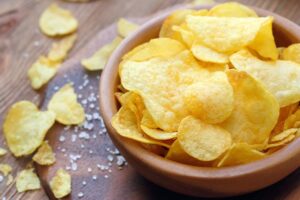
One of the best things about dental implants is their ability to restore a great deal of chewing power. Once your new teeth are in place, you should be able to enjoy virtually all of your favorite snacks, meals, and treats. Before that happy time, however, you will need to go through a complex treatment process, which includes a minor surgical procedure. As you recover, it is important that you avoid certain foods. In this blog post, you will get some practical guidance for eating after dental implant surgery.
Foods and Beverages to Avoid
For optimal healing and a reduced risk of irritation and injury to the implant sites, you should temporarily avoid the following types of foods:
- Crunchy foods, such as popcorn, chips, nuts, and raw vegetables, which can disturb the surgical area or become lodged in it.
- Chewy foods, including bagels, tough breads, and steak, as these may strain your healing jaw and cause irritation.
- Sticky foods, like caramel, gum, or certain candies, which might dislodge blood clots or attach to the healing tissues.
- Spicy foods, which can irritate soft tissues and cause discomfort.
- Acidic foods and beverages, such as citrus fruits and juices, tomatoes, and carbonated sodas, which may delay healing by irritating the surgical site.
- Very hot foods and drinks, like soups, coffee, and tea, as high temperatures could disrupt clot formation and healing.
- Alcoholic beverages, which may interact negatively with prescribed medications and impede your healing process.
- Foods with small seeds, such as strawberries, sesame rolls, or seeded breads, since seeds could become trapped at the surgical site.
What to Eat Instead
At first, you may need to adhere to a no-chew diet, which should consist mostly of liquids. After a few days, you may be able to start consuming things that require minimal chewing. Here are examples of foods that are generally safe after dental implant surgery:
- Soft foods, such as mashed potatoes, scrambled eggs, yogurt, and blended soups.
- Room temperature or cool foods, which will help reduce swelling and minimize discomfort
- Protein-rich options that require minimal chewing, like cottage cheese, tofu, or well-blended smoothies (without seeds).
- Cooked or steamed vegetables that are soft and easy to swallow.
- Oatmeal, applesauce, and pudding for snacks or light meals.
When You Can Resume Normal Eating
Your ability to return to your regular diet will depend on your individual healing progress and the recommendations of your dental professional. Typically, most patients can begin to reintroduce more solid foods after about one to two weeks, once the initial healing has progressed. However, you should wait for your dentist to confirm when it is safe to do so.
Dental implant surgery can temporarily take you away from your favorite foods, but hopefully, you will soon have a complete and strong set of teeth that can handle any meal.
Meet the Practice
At All Dental, we are proud to offer comprehensive dental implant services, including the placement surgery. We are always happy to answer patients’ questions about how they can make a success out of their treatment. If you would like to learn more about the dental implant process and what to expect during its different stages, we would be pleased to speak with you. Contact our office at 508-217-7265.
